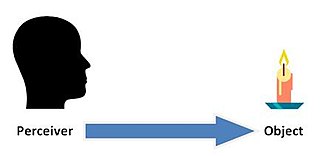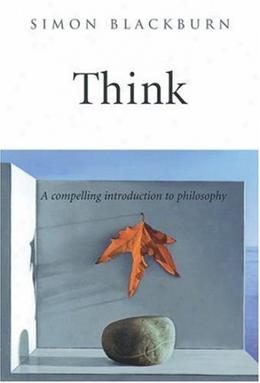In analytic philosophy, anti-realism is the position that the truth of a statement rests on its demonstrability through internal logic mechanisms, such as the context principle or intuitionistic logic, in direct opposition to the realist notion that the truth of a statement rests on its correspondence to an external, independent reality. In anti-realism, this external reality is hypothetical and is not assumed.

Existence is the state of having being or reality in contrast to nonexistence and nonbeing. Existence is often contrasted with essence: the essence of an entity is its essential features or qualities, which can be understood even if one does not know whether the entity exists.
Metaphilosophy, sometimes called the philosophy of philosophy, is "the investigation of the nature of philosophy". Its subject matter includes the aims of philosophy, the boundaries of philosophy, and its methods. Thus, while philosophy characteristically inquires into the nature of being, the reality of objects, the possibility of knowledge, the nature of truth, and so on, metaphilosophy is the self-reflective inquiry into the nature, aims, and methods of the activity that makes these kinds of inquiries, by asking what is philosophy itself, what sorts of questions it should ask, how it might pose and answer them, and what it can achieve in doing so. It is considered by some to be a subject prior and preparatory to philosophy, while others see it as inherently a part of philosophy, or automatically a part of philosophy while others adopt some combination of these views.

Metaphysics is the branch of philosophy that examines the basic structure of reality. It is traditionally seen as the study of mind-independent features of the world, but some theorists view it as an inquiry into the conceptual framework of human understanding. Some philosophers, including Aristotle, designate metaphysics as first philosophy to suggest that it is more fundamental than other forms of philosophical inquiry.

Plato was an ancient Greek philosopher of the Classical period who is considered a foundational thinker in Western philosophy and an innovator of the written dialogue and dialectic forms. He influenced all the major areas of theoretical philosophy and practical philosophy, and was the founder of the Platonic Academy, a philosophical school in Athens where Plato taught the doctrines that would later become known as Platonism.
Skepticism, also spelled scepticism in British English, is a questioning attitude or doubt toward knowledge claims that are seen as mere belief or dogma. For example, if a person is skeptical about claims made by their government about an ongoing war then the person doubts that these claims are accurate. In such cases, skeptics normally recommend not disbelief but suspension of belief, i.e. maintaining a neutral attitude that neither affirms nor denies the claim. This attitude is often motivated by the impression that the available evidence is insufficient to support the claim. Formally, skepticism is a topic of interest in philosophy, particularly epistemology.

Semantics is the study of linguistic meaning. It examines what meaning is, how words get their meaning, and how the meaning of a complex expression depends on its parts. Part of this process involves the distinction between sense and reference. Sense is given by the ideas and concepts associated with an expression while reference is the object to which an expression points. Semantics contrasts with syntax, which studies the rules that dictate how to create grammatically correct sentences, and pragmatics, which investigates how people use language in communication.
Truth or verity is the property of being in accord with fact or reality. In everyday language, it is typically ascribed to things that aim to represent reality or otherwise correspond to it, such as beliefs, propositions, and declarative sentences.

Reductionism is any of several related philosophical ideas regarding the associations between phenomena which can be described in terms of simpler or more fundamental phenomena. It is also described as an intellectual and philosophical position that interprets a complex system as the sum of its parts.

Simon Walter Blackburn is an English academic philosopher known for his work in metaethics, where he defends quasi-realism, and in the philosophy of language. More recently, he has gained a large general audience from his efforts to popularise philosophy. He has appeared in multiple episodes of the documentary series Closer to Truth. During his long career, he has taught at Oxford University, Cambridge University, and University of North Carolina, Chapel Hill.

In philosophy of perception and epistemology, naïve realism is the idea that the senses provide us with direct awareness of objects as they really are. When referred to as direct realism, naïve realism is often contrasted with indirect realism.
An autological word expresses a property that it also possesses. For example, the word "word" is a word, the word "English" is (in) English, the word "writable" is writable, and the word "pentasyllabic" has five syllables.

Gilbert Ryle was a British philosopher, principally known for his critique of Cartesian dualism, for which he coined the phrase "ghost in the machine." Some of Ryle's ideas in philosophy of mind have been called behaviourist. In his best-known book, The Concept of Mind (1949), he writes that the "general trend of this book will undoubtedly, and harmlessly, be stigmatised as 'behaviourist'." Having studied the philosophers Bernard Bolzano, Franz Brentano, Alexius Meinong, Edmund Husserl, and Martin Heidegger, Ryle suggested that the book instead "could be described as a sustained essay in phenomenology, if you are at home with that label."

Philosophy and economics studies topics such as public economics, behavioural economics, rationality, justice, history of economic thought, rational choice, the appraisal of economic outcomes, institutions and processes, the status of highly idealized economic models, the ontology of economic phenomena and the possibilities of acquiring knowledge of them.
Philosophy is the study of general and fundamental problems concerning matters such as existence, knowledge, values, reason, mind, and language. It is distinguished from other ways of addressing fundamental questions by being critical and generally systematic and by its reliance on rational argument. It involves logical analysis of language and clarification of the meaning of words and concepts.
Allan Fletcher Gibbard is the Richard B. Brandt Distinguished University Professor of Philosophy Emeritus at the University of Michigan, Ann Arbor. Gibbard has made major contributions to contemporary ethical theory, in particular metaethics, where he has developed a contemporary version of non-cognitivism. He has also published articles in the philosophy of language, metaphysics, and social choice theory: in social choice, he first proved the result known today as Gibbard-Satterthwaite theorem, which had been previously conjectured by Michael Dummett and Robin Farquharson.

Economic methodology is the study of methods, especially the scientific method, in relation to economics, including principles underlying economic reasoning. In contemporary English, 'methodology' may reference theoretical or systematic aspects of a method. Philosophy and economics also takes up methodology at the intersection of the two subjects.

Quietism in philosophy sees the role of philosophy as broadly therapeutic or remedial. Quietist philosophers believe that philosophy has no positive thesis to contribute; rather, it defuses confusions in the linguistic and conceptual frameworks of other subjects, including non-quietist philosophy. For quietists, advancing knowledge or settling debates is not the job of philosophy, rather philosophy should liberate the mind by diagnosing confusing concepts.

Philosophy is a systematic study of general and fundamental questions concerning topics like existence, reason, knowledge, value, mind, and language. It is a rational and critical inquiry that reflects on its methods and assumptions.

Think: A Compelling Introduction to Philosophy is a 1999 book by the philosopher Simon Blackburn. It is intended to serve as an introduction to philosophy.












